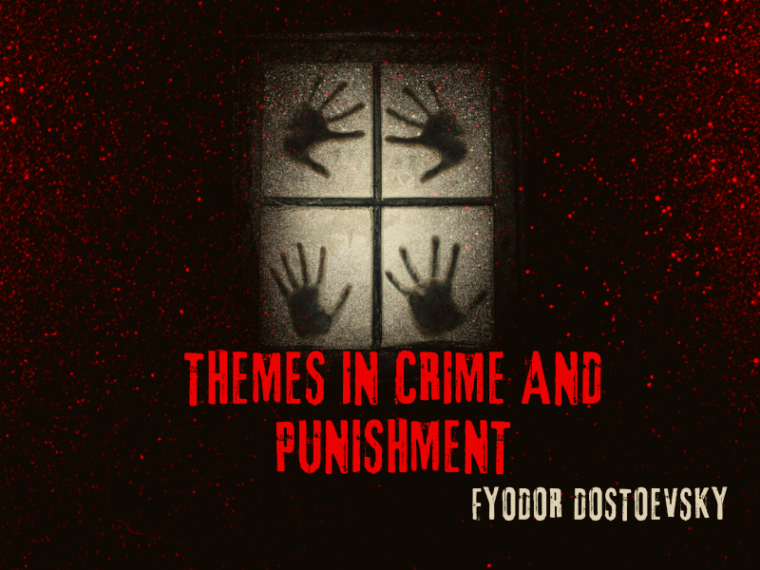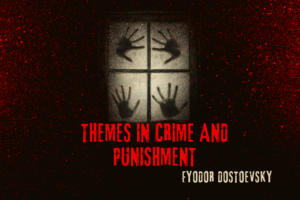About Author
Crime and Punishment” is a novel by Fyodor Dostoevsky that explores the psychological and moral consequences of crime. Published in 1866, the novel has since become a classic of Russian literature and is known for its depth and complexity. Exploring the Psychological and Moral Themes in Crime and Punishment.
In the novel, the main character, Rodion Raskolnikov, is a struggling ex-student who decides to commit a crime in order to prove his superiority and test his theory that certain people are above the law.
He murders an old pawnbroker and her sister, but is plague guilt and psychological torment after the fact. The rest of the novel follows his attempts to escape punishment and his eventual redemption.
Dostoevsky’s novel is a powerful exploration of the human psyche and the consequences of immoral behavior. Through Raskolnikov’s experiences, the novel asks deep questions about morality, justice, and the nature of punishment. The novel also explores themes such as poverty, social inequality, and the struggle for personal identity.
Introduction
Crime and Punishment is a novel written by Fyodor Dostoevsky that explores the psychological and moral consequences of crime. Published in 1866, the novel has since become a classic of Russian literature and is known for its depth and complexity.
In this article, we will dive deep into the psychological and moral themes of the novel, and explore its enduring relevance in today’s world. Exploring the Psychological and Moral Themes in Crime and Punishment
Summary
Crime and Punishment by Fyodor Dostoevsky is a novel that delves into complex psychological and moral themes. The story follows the protagonist, Raskolnikov, as he grapples with the guilt of murdering a pawnbroker and her sister. The novel explores the complexities of guilt, the ambiguity of justice, and the struggle to establish personal identity in a society marked by social inequality.
The theme of guilt highlights the importance of taking responsibility for one’s actions and the toll that guilt can take on a person’s psyche. Exploring the Psychological and Moral Themes in Crime and Punishment
The novel challenges the notion of justice and whether it can ever truly be achieved. Raskolnikov’s punishment is both physical and psychological, providing him with the opportunity to reflect on his actions and to begin the process of redemption.
Crime and Punishment also examines the personal consequences of immoral behavior and how it can affect an individual’s relationships and future. The novel highlights the harsh realities of poverty and social injustice in 19th-century Russia, and how they can lead to moral corruption.
Overall, Crime and Punishment is a literary masterpiece that raises important questions about morality, responsibility, and the role of individuals in shaping society. It remains a relevant and enduring work of Russian literature.
The Complexities of Guilt in Crime and Punishment
Guilt is a key psychological and moral theme in Crime and Punishment. The novel’s protagonist, Raskolnikov, is consumed by his guilt over the murder of the pawnbroker and her sister. As readers follow Raskolnikov’s journey, they get valuable insights into the complex nature of guilt and its impact on an individual’s behavior and emotions.
Raskolnikov’s guilt is both a psychological and emotional burden. He believes that he is superior to other people and that his actions were justified, but as the story progresses, he begins to understand the true nature of his guilt.
Dostoevsky shows readers the importance of taking responsibility for one’s actions and the toll that guilt can take on a person’s psyche. The novel’s exploration of guilt raises important questions about morality and the consequences of our actions.
The Psychology of Guilt in Crime and Punishment
The theme of guilt is central to Crime and Punishment, and is explored in depth through the character of Rodion Raskolnikov. From the moment he commits the murders of the pawnbroker and her sister, Raskolnikov is plagued by guilt and psychological torment.
The novel explores the complex emotions and thought patterns. That arise from such immoral behavior, and provides valuable insights into the human psyche.
The Ambiguity of Justice in Crime and Punishment
The theme of justice is also an important element of Crime and Punishment. Raskolnikov believes that he is above the law and that his actions were for the greater good. But the novel challenges the notion of justice and whether it can ever truly be achieved. Raskolnikov’s punishment is both physical and psychological, and the novel explores the impact of punishment on the human psyche.
The novel also examines the personal consequences of immoral behavior and how it can affect an individual’s relationships and future.
Raskolnikov’s punishment provides him with the opportunity to reflect on his actions and to begin the process of redemption. The theme of justice in Crime and Punishment raises important questions about morality, responsibility, and the role of punishment in society.
Justice and Punishment in Crime and Punishment
The novel also explores themes of justice and punishment, as Raskolnikov struggles to escape the consequences of his crime. Dostoevsky raises important questions about the nature of justice, and whether punishment is an effective means of achieving it.
Through the character of Raskolnikov, the novel also explores the personal consequences of immoral behavior, and the impact it can have on one’s own life and relationships.
The theme of guilt is one of the most important psychological and moral themes in Crime and Punishment. Raskolnikov, the main character of the novel, is haunted by the guilt of murdering the pawnbroker and her sister.
His guilt and conscience never leave him, and he begins to experience severe psychological and emotional turmoil. The novel provides readers with valuable insights into the psychology of guilt and how it affects an individual’s behavior and mental state.
Raskolnikov’s guilt leads him to believe that he is superior to ordinary people, and that his actions were justified because they were for the greater good. However, as the story progresses, he realizes the true nature of his guilt and comes to terms with his actions.
Personal Identity and Social Inequality in Crime and Punishment
In addition to its exploration of the psychological and moral consequences of crime, Crime and Punishment also delves into themes.
Through the character of Raskolnikov, the novel portrays the struggle to establish a personal identity in a world that values wealth and social status. It also shines a light
on the harsh realities of poverty and social inequality. In 19th century Russia, and the impact they can have on individual lives.
Through the character of Raskolnikov, the novel portrays the struggle to establish a personal identity in a world that values wealth and social status. Raskolnikov is a complex character who struggles to find his place in society. And to reconcile his intellectual and moral beliefs.
The novel also highlights the harsh realities of poverty and social injustice in 19th-century Russia. Dostoevsky shows how poverty and social inequality can lead to moral corruption as people struggle to survive in a world . The theme of social inequality in Crime and Punishment raises. The important questions about the nature of society and the role of individuals in shaping it.
Conclusion
In conclusion, Crime and Punishment by Fyodor Dostoevsky is a powerful exploration of the human psyche and the consequences of immoral behavior.
Through its exploration of themes such as guilt, justice, personal identity, and social inequality. The novel provides valuable insights into the complexities of the human experience. Its enduring relevance is a testament to its enduring value as a literary classic.
Through the character of Raskolnikov, the novel provides readers with valuable insights into. The complexities of guilt, justice, personal identity, and social inequality. The novel’s enduring relevance is a testament to its enduring value as a literary masterpiece.





